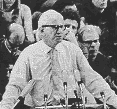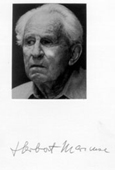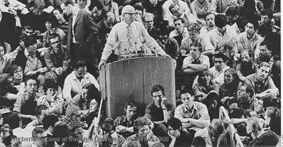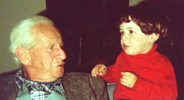Herbert Marcuse (1898-1979)


 Herbert Marcuse was born in Berlin in 1898. After writing his Ph.D.
thesis at the University of Freiburg, he began work at the Frankfurt Institute
for Social Research, a Marxist-oriented think-tank (as we might say today). He
emigrated from Germany shortly after Hitler was elected in 1933, going first to
Switzerland, then the United States, where he became a citizen in 1940. During
World War II he worked for the US Office of Strategic Services (forerunner of
the CIA), analyzing intelligence reports about Germany. In the 1950s he began
a university teaching career as a philosopher, first at Columbia and Harvard,
then at Brandeis University from 1958 to 1965, and finally (already retirement-age),
at the University of California, San Diego. His critiques of capitalist society
resonated with the concerns of the leftist student movement in the 1960s, and
he became known as "the father of the new left." He had many speaking
engagements in the US and Europe in the late 1960s and in the 1970s. He died while
visiting Germany in 1979.
Herbert Marcuse was born in Berlin in 1898. After writing his Ph.D.
thesis at the University of Freiburg, he began work at the Frankfurt Institute
for Social Research, a Marxist-oriented think-tank (as we might say today). He
emigrated from Germany shortly after Hitler was elected in 1933, going first to
Switzerland, then the United States, where he became a citizen in 1940. During
World War II he worked for the US Office of Strategic Services (forerunner of
the CIA), analyzing intelligence reports about Germany. In the 1950s he began
a university teaching career as a philosopher, first at Columbia and Harvard,
then at Brandeis University from 1958 to 1965, and finally (already retirement-age),
at the University of California, San Diego. His critiques of capitalist society
resonated with the concerns of the leftist student movement in the 1960s, and
he became known as "the father of the new left." He had many speaking
engagements in the US and Europe in the late 1960s and in the 1970s. He died while
visiting Germany in 1979.
For biographical information about him, see:

- a short biography grandson Harold (me) prepared
for a presentation at a screening of the documentary film Herbert's Hippopotamus
in 1997.
- Marxists.org's
page has a short
biographical sketch as well as some full-text chapters from Reason and
Revolution (1941), and One Dimensional Man (1964). (And the ink portrait
used for the logo on this page.)
- The Berlin German
Historical Museum's page has a nice time-line type biography and a couple
of portraits in its on-line exhibition.
Comprehensive Web Sites and Links Pages

Other Sites of Interest and Sources of Information
-
 Herbert's Hippopotamus is a 1 hr. 9 min. documentary video made
by UCSD film student Paul Alexander Juutilainen in 1996. It is a wonderful
film about Herbert's traces at UCSD, with great documentary footage and contemporary
interviews. One reviewer wrote: "This Emmy award-winning documentary explores
the historical background for the cultural encounter between European Critical
Thinking, the Third World, Feminist and Anti-war movements, as well as the
political turmoil and institutional pressures in reaction to these coalitions."
Herbert's Hippopotamus is a 1 hr. 9 min. documentary video made
by UCSD film student Paul Alexander Juutilainen in 1996. It is a wonderful
film about Herbert's traces at UCSD, with great documentary footage and contemporary
interviews. One reviewer wrote: "This Emmy award-winning documentary explores
the historical background for the cultural encounter between European Critical
Thinking, the Third World, Feminist and Anti-war movements, as well as the
political turmoil and institutional pressures in reaction to these coalitions."
- Unfortunately, we have lost touch with Mr. Juutilainen, and don't know
where one can order a copy. It is available through interlibrary loans
from UCSD, however.
- For a detailed description, see this UC
Santa Cruz campus newspaper article.
- The film is discussed in an article
about resistance to the marines by UC Berkeley political science graduate
student John Brady, published in 1998 in the on-line journal Bad Subjects.
In Print

- One Dimensional Man (1964) is Herbert's best-known work.
Amazon
sells the 1992 edition for $16 (or $7.20 used), and has a page
with 2 customer reviews. It is available
in German for DM20, too.
- Eros and Civilization (1955). One of Herbert's very well-known
early works. Its title plays on Freud's Civilization and its Discontents.
This vision of a non-repressive society, based on Marx and Freud, anticipated
the values of 1960s countercultural movements. Amazon
sells it for $13.60 and has several customer reviews.
Also available in German (DM32
from amazon.de).
 The
Aesthetic Dimension: Toward a Critique of Marxist Aesthetics (Boston:
Beacon, 1978), 88 pages.
The
Aesthetic Dimension: Toward a Critique of Marxist Aesthetics (Boston:
Beacon, 1978), 88 pages.
Reviewer Elliott Green (German major at Princeton, MPhil student in Development
Studies at the London School of Economics) wrote on Amazon: "Herbert Marcuse,
original member of the so-called 'Frankfurt School', here presents a critique
of Marxist aesthetics in one of his last books. Although only 72 pages long,
the book is powerful in its argument against the orthodox Marxist view that
'art represents its the interests and world outlook of particular social classes.'
Marcuse argues for the importance of art in itself, apart from its source, writing,
'the criteria for the progressive character of art are given only in the work
itself as a whole: in what it says and how it says it.' He truly believes that
art's place in the world is not to change the world directly but to influence
how people perceive the world and thereby lead them to change it. Marcuse also
touches upon other aspects of aesthetics, like his belief in a constant standard
allowing us to distinguish between high and low art and the question of the
'end of art' as posited by Bertolt Brecht and others. Nevertheless his main
argument is most powerful: he ends the book by praising art's role in representing
'the ultimate goal of all revolutions: the freedom and happiness of the individual.'
Truly a valuable book for all students of art, aesthetics and philosophy.
 Herbert's papers from 1942-51, Technology, War and Fascism,
edited by Douglas Kellner and Peter Marcuse (Routledge, 1998). publisher's
page (with table of contents).
Herbert's papers from 1942-51, Technology, War and Fascism,
edited by Douglas Kellner and Peter Marcuse (Routledge, 1998). publisher's
page (with table of contents).
Sold for $45 at Borders.com (page
with reviews), and $23
at Amazon.com.
Review in the Canadian Journal of Sociology (Mar./Apr. 2000)
This is the first volume in a series of six.
- Volume II, Towards a Critical Theory of Society, with papers
from the 1960s and early 1970s and an afterword by Juergen Habermas, is due
out 25 June 2001. publisher's
page ($35
from Amazon)
 Contents:
Contents:
Introduction 1. The Problem of Social Change in the Technological Society
2. The Individual in the Great Society 3. The Containment of Social Change
in Industrial Society 4. 1966 Political Preface to Eros and Civilization 5.
Beyond One-Dimensional Man 6. Cultural Revolution 7. The Historical Fate of
the Bourgeois Democracy 8. Watergate: When Law and Morality Stand in the Way
9. A Revolution in Values 10. Letters: Herbert Marcuse to Leo Lowenthal; Leo
Lowenthal to Richard Popkin; Herbert Marcuse to T.W. Adorno; T.W. Adorno and
Max Horkheimer to Herbert Marcuse; Herbert Marcuse to T.W. Adorno and Max
Horkheimer; Herbert Marcuse to Raya Dunayevskaya; Raya Dunayevskaya to Herbert
Marcuse.
- Peter-Erwin
Jansen is publishing Marcuse's unpublished writings in German, as
well:

- Herbert Marcuse: Nachgelassene Schriften 1: Das Schicksal der
b�rgerlichen Demokratie, edited and with a preface by Peter-Erwin
Jansen, introduction by Oskar Negt (Lüneburg: Klampen, 2000), 176
pages, DM38.00.
Contents:
1. Zum Problem des sozialen Wandels; 2. Jenseits des Eindimensionalen
Menschen; 3. Das historische Schicksal der bürgerlichen Demokratie;
4. Eine Revolution der Werte; 5. Antidemokratische Volksbewegungen; 6.
Kulturrevolution
Amazon.de
page with descriptions; Feb.
2000 Die Welt review by Bernd Rabehl; hostile Dec.
1999 FAZ review by Stefan Breuer (archive
copy).
(Note that this is a different selection of manuscripts than the English
edition of Marcuse's papers.)
- 2: Kunst und Befreiung, edited with a preface by Peter-Erwin
Jansen, introduction by Gerhard Schweppenh�user, 166 pages. (DM38
von amazon.de)
In Kunst und Befreiung sind Marcuses unver�ffentlichte Arbeiten
zur �sthetik von den sp�ten 40er Jahren bis 1978 gesammelt. Von seinem
fr�hen Beitrag zu Aragon �ber "Kunst in der eindimensionalen Gesellschaft"
bis hin zum sp�ten "Entwurf von La Jolla" ziehen sich die gro�en Motive
der Marcuseschen Kunstauffassung durch die in diesem Band versammelten
Texte: der mit ihrem affirmativen Charakter verwobene utopische �berschu�
in gro�er Kunst, die M�glichkeit von Dichtung nach Auschwitz, die Permanenz
der Kunst angesichts des auch von einer befriedeten Gesellschaft nicht
zu verhindernden Leids und der Endlichkeit der Menschen.
Contents:
1. Kunst und Revolte; 2. Entwurf von La Jolla; 3. Die Zukunft der Kunst,
Gesellschaft als Kunstwerk; 4. Kunst in der eindimensionalen Gesellschaft;
5. Briefe über Surrealismus; 6. Aragon; 7. Proust-Notizen.
See the Dec.
2000 Deutschlandfunk review of vols. 1 and 2 by Johan Hartle;
Feb.
2001 literaturkritik.de review by Rolf L�chel.
- 3: Philosophie und Psychoanalyse.
Edited by Peter-Erwin Jansen, introduction by Alfred Schmidt, (sched.
pub. date October 2001).
Contents:
1. Jenseits des Realitätsprinzips; 2. Antwort auf Erich Fromm; 3.
Die Anklage der westlichen Philosophie in Freuds Theorie; 4. Eros und
Kultur; 5. Soziale und psychologiesche Repression; 6. Die Bedeutung des
Todes; 7. Gedanken zu einer negativen Metaphysik
- 4: Die Studentenbewegung und Ihre Folgen. Edited by Peter-Erwin
Jansen, introduction by Wolfgang Kraushaar, (October 2002).
Contents:
1. Hat die Demokratie eine Zukunft? 2. Die Errichtung Israels war ein
politischer Akt; 3. Komplex Angela Davis; 4. Stellungnahme zur Kuba-Krise;
5. Briefwechsel mit Rudi Dutschke; 6. Vietnam Komplex
See also: Wolfgang Kraushaar (ed.): Frankfurter Schule und Studentenbewegung:
Von der Flaschenpost zum Molotowcocktail 1946-1995. 3 vols. (Frankfurt:
Rogner & Bernhard, 1998), together 1816pp; 75,- DM. (June
1998 FAZ review; archive
copy)
- 5: Oekologie und Gesellschaftskritik. Edited by Peter-Erwin
Jansen, introduction by Iring Fetscher. (October 2003).
Contents (preliminary):
1. Oekologie und Gesellschaftskritik; 2. Der Eurokommunismus als 'historischer
Kompromiss'.
-
 Feindanalysen: �ber die Deutschen, edited
by Peter-Erwin Jansen and introduced by Detlev Claussen (zu Klampen, 1998),
149pp.
Feindanalysen: �ber die Deutschen, edited
by Peter-Erwin Jansen and introduced by Detlev Claussen (zu Klampen, 1998),
149pp.
Contents:
1. Die neue deutsche Mentalität; 2. Darstellung des Feindes; 3. Ueber
psychologische Neutralität; 4. Ueber soziale und politische Aspekte des
Nationalsozialismus; 5. Kriegs- und Nachkriegsgeneration; 6. Deutsche Philosophie
im zwanzigsten Jahrhundert; 7. 33 Thesen; 8. Ist eine freie Gesellschaft gegenwärtig
möglich?
The bol.de
page has the following description from the Zurich Weekly News,
4 June 1998: "An exciting find: Herbert Marcuse's American Writings on
Germany. What kind of people were the Germans under Hitler? In these memoranda,
published now for the first time, which the exiled philosopher wrote for the
US government during World War II, we find astonishingly modern answers. ...
We have the initiative of the small publisher in Lüneburg and the tenacity
of the Frankfurt Marcuse-Expert Peter-Erwin Jansen to thank for the publication
of these hitherto unknown works by Marcuse. In the context of the discussions
about Germans as followers of Hitler that have been reignited by the Goldhagen
debate, these texts deserve attention far beyond the circle of unwavering
Marcuse readers."
Editor P.-E. Jansen adds: "In June 1998 this book was at the top of the best-seller
lists of the Süddeutsche Zeitung (nonfiction), BuchJournal, and the Norddeutscher
Rundfunk radio station."
See also the July
1998 FAZ review (archive
copy).
 Gespräche mit Herbert Marcuse. (Edition Suhrkamp, 1978)
(DM10
from amazon.de)
Gespräche mit Herbert Marcuse. (Edition Suhrkamp, 1978)
(DM10
from amazon.de)
Contents: Theorie und Politik (July 1977 in Starnberg, with Habermas,
Heinz Lubasz, and Tilman Spengler);
Weiblichkeitsbilder (July 1977 in Pontresina, Switzerland [Herbert's
favorite vacation spot], with Silvia Bovenschen and Marianne Schuller);
Salecina (1975 interview and summer 1977, with Erica Sherover, Berthold
Rothschild, Theo Pinkus);
Radikale Philosophie: Dir Frankfurter Schule (undated BBC broadcasts,
with Lubasz, Alfred Schmidt, Karl Popper, Ralf Dahrendorf, Rudi Dutschke);
"So sieht in der bürgerlichen Gesellschaft der Fortschritt aus..."
(Nov. 1977 in La Jolla, with Hans Christoph Buch).
- Peter Marcuse, Herbert's son, is the literary executor for Herbert's
estate. Requests to publish any of Herbert's writings should be addressed
to him at [email protected].
 Herbert's Legacy
Herbert's Legacy
A professor's legacy is visible not only through publications, but in (former)
students as well. Abbie Hoffman and Angela Davis,
now Professor in the History of Consciousness program at UC Santa Cruz, are
two of Herbert's best-known. Angela's
autobiography (1988); 1997
NYTimes review of Jonah Raskin's biography of Abbie.
The Frankfurt School and Critical Theory since the 1980s
Numerous scholars were strongly influenced by members of the Frankfurt School
(actually the Institut fuer Sozialforschung in Frankfurt; website
with history in English)
and consider themselves practitioners of Critical Theory. Juergen Habermas
(b. 1929) is by far the best known (linkography
by Antti Kauppinen, postgrad student of philosophy at the University of
Helsinki; overview and
resources by Steve Robinson, student at Michigan State University).
A younger generation of scholars who studied in the 1960s can more properly
be considered "students" of Marcuse and other members of the Frankfurt
School. In 1999 for instance, Detlev Claussen, Oskar Negt
und Michael Werz, at the University of Hannover in Germany, began
publishing a series called the "Hannoversche Schriften," which
is devoted to the continuing influence of Critical Theory. The first volume,
Keine Kritische Theorie ohne Amerika, was reviewed by Micha Brumlik in
the FAZ
in Dec. 1999 (archive copy).
Other famous Marcuses of Herbert's generation

top of this page
page created by Harold
Marcuse in Nov. 1997
last updated August 5, 2001
contact: [email protected]

hits since March 27, 2001
(684 hits on Aug. 5, 2001)

 Herbert Marcuse was born in Berlin in 1898. After writing his Ph.D.
thesis at the University of Freiburg, he began work at the Frankfurt Institute
for Social Research, a Marxist-oriented think-tank (as we might say today). He
emigrated from Germany shortly after Hitler was elected in 1933, going first to
Switzerland, then the United States, where he became a citizen in 1940. During
World War II he worked for the US Office of Strategic Services (forerunner of
the CIA), analyzing intelligence reports about Germany. In the 1950s he began
a university teaching career as a philosopher, first at Columbia and Harvard,
then at Brandeis University from 1958 to 1965, and finally (already retirement-age),
at the University of California, San Diego. His critiques of capitalist society
resonated with the concerns of the leftist student movement in the 1960s, and
he became known as "the father of the new left." He had many speaking
engagements in the US and Europe in the late 1960s and in the 1970s. He died while
visiting Germany in 1979.
Herbert Marcuse was born in Berlin in 1898. After writing his Ph.D.
thesis at the University of Freiburg, he began work at the Frankfurt Institute
for Social Research, a Marxist-oriented think-tank (as we might say today). He
emigrated from Germany shortly after Hitler was elected in 1933, going first to
Switzerland, then the United States, where he became a citizen in 1940. During
World War II he worked for the US Office of Strategic Services (forerunner of
the CIA), analyzing intelligence reports about Germany. In the 1950s he began
a university teaching career as a philosopher, first at Columbia and Harvard,
then at Brandeis University from 1958 to 1965, and finally (already retirement-age),
at the University of California, San Diego. His critiques of capitalist society
resonated with the concerns of the leftist student movement in the 1960s, and
he became known as "the father of the new left." He had many speaking
engagements in the US and Europe in the late 1960s and in the 1970s. He died while
visiting Germany in 1979.

 Herbert's Hippopotamus is a 1 hr. 9 min. documentary video made
by UCSD film student Paul Alexander Juutilainen in 1996. It is a wonderful
film about Herbert's traces at UCSD, with great documentary footage and contemporary
interviews. One reviewer wrote: "This Emmy award-winning documentary explores
the historical background for the cultural encounter between European Critical
Thinking, the Third World, Feminist and Anti-war movements, as well as the
political turmoil and institutional pressures in reaction to these coalitions."
Herbert's Hippopotamus is a 1 hr. 9 min. documentary video made
by UCSD film student Paul Alexander Juutilainen in 1996. It is a wonderful
film about Herbert's traces at UCSD, with great documentary footage and contemporary
interviews. One reviewer wrote: "This Emmy award-winning documentary explores
the historical background for the cultural encounter between European Critical
Thinking, the Third World, Feminist and Anti-war movements, as well as the
political turmoil and institutional pressures in reaction to these coalitions."
 Andrew Feenberg,
professor of philosophy at San Diego State University, has and an "appreciation"
(commentary on one of Herbert's last speeches, "Obstinacy as a Theoretical
Virtue"), an article
about Herbert on technology, and a nice
picture of Herbert with Feenberg's son Nick.
Andrew Feenberg,
professor of philosophy at San Diego State University, has and an "appreciation"
(commentary on one of Herbert's last speeches, "Obstinacy as a Theoretical
Virtue"), an article
about Herbert on technology, and a nice
picture of Herbert with Feenberg's son Nick.




 The
Aesthetic Dimension: Toward a Critique of Marxist Aesthetics (Boston:
Beacon, 1978), 88 pages.
The
Aesthetic Dimension: Toward a Critique of Marxist Aesthetics (Boston:
Beacon, 1978), 88 pages. Herbert's papers from 1942-51, Technology, War and Fascism,
edited by Douglas Kellner and Peter Marcuse (Routledge, 1998). publisher's
page (with table of contents).
Herbert's papers from 1942-51, Technology, War and Fascism,
edited by Douglas Kellner and Peter Marcuse (Routledge, 1998). publisher's
page (with table of contents).  Contents:
Contents:
 Feindanalysen: �ber die Deutschen, edited
by Peter-Erwin Jansen and introduced by Detlev Claussen (zu Klampen, 1998),
149pp.
Feindanalysen: �ber die Deutschen, edited
by Peter-Erwin Jansen and introduced by Detlev Claussen (zu Klampen, 1998),
149pp. Gespräche mit Herbert Marcuse. (Edition Suhrkamp, 1978)
(DM10
from amazon.de)
Gespräche mit Herbert Marcuse. (Edition Suhrkamp, 1978)
(DM10
from amazon.de) Herbert's Legacy
Herbert's Legacy 
